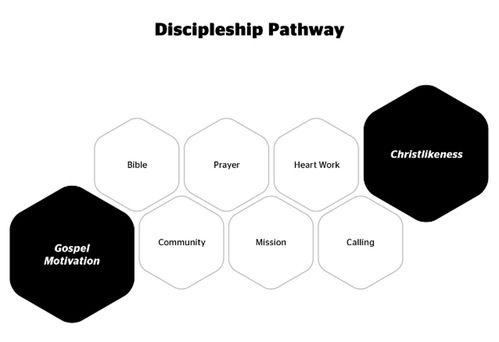The Discipleship Pathway, A Recap

by Scott Mehl
Following Jesus can be confusing. I mean, don’t get me wrong, following Jesus is incredible. It is soul-satisfying. It is life-defining. It is hope-ensuring. But, sometimes, it can also be confusing. When you crack open your Bible and read through the New Testament you find a litany of instructions and descriptions of what following Jesus entails. Sometimes the instructions come through parables, sometimes they come through analogies, and sometimes they just come in a laundry list.
On top of that, you go to church each week and hear sermons on various different topics with various different exhortations. Maybe you also read a Christian book, or listen to a podcast, or download an additional sermon, and quickly you find that you’re inundated by different instructions, exhortations, and reminders, and you may not know exactly what to do with them all. They’re all good. They’re all true. But the sheer amount of input many of us receive in a given week, let alone a given month, can leave us a bit confused.
If you’ve been at Cornerstone for very long you’ve probably heard us talk about the Discipleship Pathway. The Pathway was born out of a desire to help bring simplicity and order to this confusion. In the Discipleship Pathway we seek to summarize all the biblical instructions and exhortations we’ve been given into six general categories that provide a vocabulary to understand the Christian life.
On top of that, you go to church each week and hear sermons on various different topics with various different exhortations. Maybe you also read a Christian book, or listen to a podcast, or download an additional sermon, and quickly you find that you’re inundated by different instructions, exhortations, and reminders, and you may not know exactly what to do with them all. They’re all good. They’re all true. But the sheer amount of input many of us receive in a given week, let alone a given month, can leave us a bit confused.
If you’ve been at Cornerstone for very long you’ve probably heard us talk about the Discipleship Pathway. The Pathway was born out of a desire to help bring simplicity and order to this confusion. In the Discipleship Pathway we seek to summarize all the biblical instructions and exhortations we’ve been given into six general categories that provide a vocabulary to understand the Christian life.

Gospel Motivation
Foundational to these six categories is what we refer to as “gospel motivation.” The entire Christian life isn’t one of dutiful obedience, but one of joyful surrender. God has loved us so completely and so perfectly that it captivates our hearts and leaves us overwhelmed with his kindness, power, and wisdom. And everything we do is meant to be a response to this overwhelming love. The Christian life was only ever designed to be lived out as a response to the love of God. When anything else motivates our actions, it is not the Christian life we are living. To motivate the Christian life in any of our hearts, we must first, and most fundamentally, stoke the fires of gospel faith which fuel all genuine love and obedience.
Loving God
This overwhelming love God has shown us produces in us a deep and genuine love for God in response. This is why Jesus taught that the first and greatest commandment is to “love the Lord your God with all your heart and with all your soul and with all your mind” (Matt 22:37). In the vocabulary of The Discipleship Pathway, we summarize the practical ways this love is manifest through three categories: Bible, Prayer, and Heart Work.
1. Bible
We manifest our love for God as we listen to and learn from him in the Bible. God has spoken and revealed himself to us through his Word, we come to know him more and more as we listen to what he has said.
2. Prayer
We manifest our love for God as we speak to and relate to God through prayer. God has given us the ability and privilege to speak directly with him. He hears us, he listens, and he loves to do so. And so we continue to grow in love and intimacy with him as we talk to him as well.
3. Heart Work
We manifest our love for God as we internalize and apply what he teaches us through what we call “heart work.” Heart work is the process by which we meditate on the truths of God, internalizing them not just in our minds but in our hearts as well, experiencing as a result, genuine transformation.
Loving Others
The Christian life doesn’t solely consist of loving God in a vacuum, however. The love that God has poured into our hearts is meant to be poured out, through us, to the world around us. This is why Jesus followed up the first and greatest commandment by saying, “a second [greatest commandment] is like it: you shall love your neighbor as yourself.” We are called to spread and display the glory of God in the lives of those around us through love. In the vocabulary of The Discipleship Pathway, we summarize the practical ways we are called to love those around us in three categories as well: Community, Mission, and Calling.
4. Community
We spread and display the glory of God as we love other Christians in community. There are numerous instructions given in the New Testament for how we are called to practically love one another in the body of Christ. We strive to live these out within communities of faith as a part of the local church.
5. Mission
We spread and display the glory of God as we love non-Christians on mission. As followers of Jesus, we aren’t just called to love one another, but to love those around us in the world as well, most fundamentally by striving to make disciples of those who don’t know Christ yet. It’s for this purpose that we strive to live, as communities of faith, on mission in our city and world.
6. Calling
We spread and display the glory of God as we love others through our various callings. Each of us has been given a combination of various vocational callings. We have jobs, roles within our families, and roles within our broader communities. Each of these roles or vocations isn’t simply an activity, it’s a calling. God has placed us in these callings so that we might love and bless others through them.
Christlikeness
As we live out this holistic Christian life of loving God and loving others through the six categories of Bible, prayer, heart work, community, mission, and calling, God uses our efforts in all of these areas to bring about his ultimate purpose for our lives. God’s purpose for every Christian’s life is that we might bring him glory as we are transformed more and more into the likeness of his Son. If gospel motivation is the foundation for the entire Christian life, growing in Christlikeness is its end.
Our hope is that, as we engage together using this simplified and summarized vocabulary, the Christian life might be a little bit less confusing. The various different teachings you hear or lessons you learn might make even more sense as you see how they fit into the Christian life as a whole. And as we do every time we talk about the Discipleship Pathway, I would encourage you to not be overwhelmed by all you need to do or all the ways you fall short in all of these different categories. Instead, I would encourage you to ask the simple question: “What’s my next step?” What’s one step of growth you can take in relation to the Bible, prayer, heart work, community, mission, or calling. And then take it!
Our hope is that, as we engage together using this simplified and summarized vocabulary, the Christian life might be a little bit less confusing. The various different teachings you hear or lessons you learn might make even more sense as you see how they fit into the Christian life as a whole. And as we do every time we talk about the Discipleship Pathway, I would encourage you to not be overwhelmed by all you need to do or all the ways you fall short in all of these different categories. Instead, I would encourage you to ask the simple question: “What’s my next step?” What’s one step of growth you can take in relation to the Bible, prayer, heart work, community, mission, or calling. And then take it!

